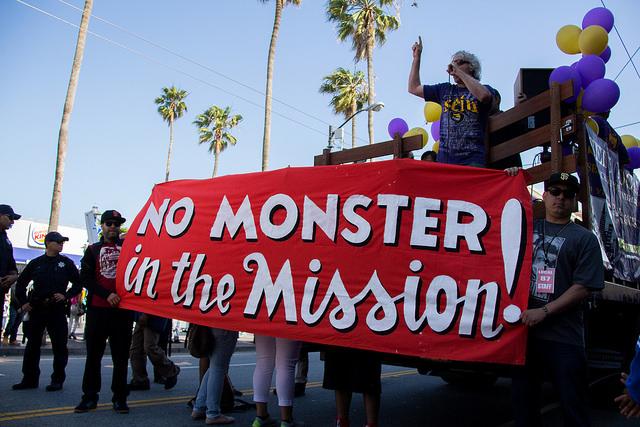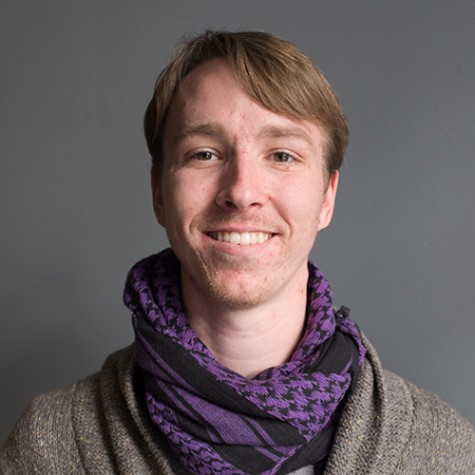Workers protest on May Day in the Bay
A speaker stands on the back of a truck giving a speech to a group of a few hundred protesters on Mission street in San Francisco during the May Day protests on May 1, 2015
May 8, 2015
Every year, workers around the country gather in solidarity for equal pay and treatment on May 1.
In San Francisco, a crowd gathered at Civic Center Plaza to hear speeches from Union Representatives, teachers from San Francisco City College and citizens from the Mission District. An eighteen-wheeler and another smaller truck, both carrying water and speakers, led the march away from Civic Center Plaza and down towards the Mission District.
In the bed of the smaller truck, two women stood behind a microphone and led the crowd in chants as the group worked its way down Mission Street. Residents walked out of their homes and poured into the streets to witness the spectacle.
The protest stopped every few blocks as the two women in the truck bed would tell the crowd about some of the residents on the street that are now facing homelessness and eviction due to the rapid growth of gentrification in the area.
The march finally came to an end on 24th street and Mission and was greeted by a performance of traditional Native American dance and music. The atmosphere was one of joy and solidarity as people celebrated the protest and made plans for the next rally on May 8 at San Francisco City Hall.
In Oakland, Pacific Maritime Association workers walked out at 9 a.m., completely shutting down the Oakland Ports until 7 p.m. that evening. Protesters and dock workers marched from the ports to Frank H. Ogawa Plaza (Oscar Grant Plaza).
Carl Dix, a founding member of the Revolution Communist Party USA, spoke to a crowd of young students and organizers gathered in front of Oakland city hall.
“It is significant that this is happening today,” Dix said. “The day when workers and oppressed peoples around the world dedicate themselves to end all exploitation and oppression.”
Once the protest turned into a general assembly, speeches were given by former members of the Black Panther Party, the International Longshore and Warehouse Union, local 10 union, students from the Berkeley Black Student Union and representatives of Mumia Abu Jamal.
“They are trying to demonize their communities (Baltimore), but anger is a rational response to murder,” said one of the organizers.
Cephus Johnson, better known as Uncle Bobby to the community and the uncle of Oscar Grant, also gave a speech.
“Had it not been for all of you, had it not been for the ILWU coming out to support Oscar Grant, if it had not been for those young people on that train pulling out their cameras and video taping what happened to Oscar on that night,” Johnson said to the crowd, “We know that with out a doubt if none of that had been done, we wouldn’t have been able to in the first time in California state history to have an officer arrested, charged, convicted and sent to jail. With this support, we can assure this can happen again.”
All of the May Day speakers echoed the same message: justice and equality for all is necessary in this country, and that their voices would not be silenced.
Oakland wrapped up the afternoon assembly at 2:30 p.m. and another group gathered that night for an additional demonstration. However, the peaceful mood from earlier that day didn’t carry over to the evening.
Oakland protests turned violent as police were over run by vandals who damaged a handful of cars and businesses on Broadway in some of the worst riots the city had seen since last November.























































































